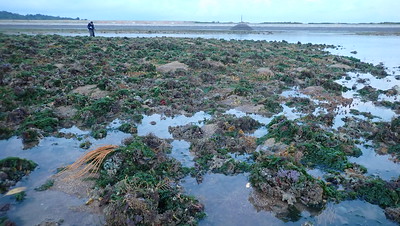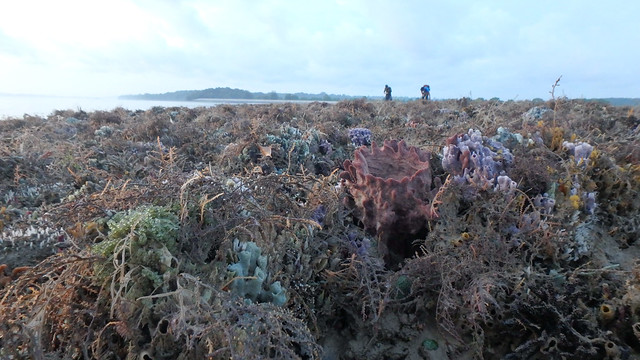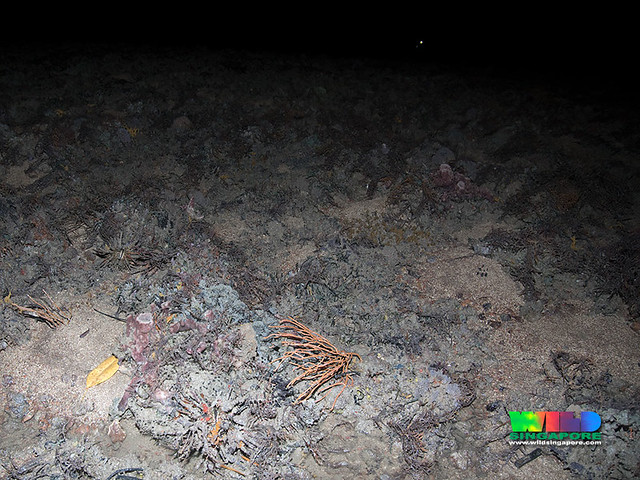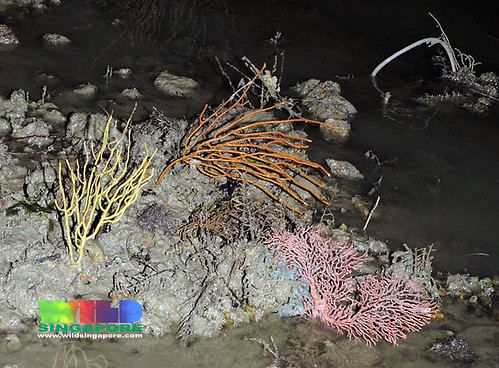The patch rich with delicate colourful animals is still there. Despite the ongoing reclamation works on Pulau Tekong nearby, today, it seems lively. Seagrasses remain abundant as much of the shore has become very soft and silty. The team saw lots of nudibranchs and other marine life. Thanks to NParks for facilitating the survey!
There is small reefy patch on Beting Bronok where sponges, sea fans and other colourful animals grow.
While Yellow bumpy sponges were still the most abundant kind, today I saw a wider variety of sponges, which were larger and 'fresh and clean' of sediments. I no longer saw large areas heavily coated in Melted chocolate sponge. This is similar to what I saw on our last survey in Jul 22.
I only saw a few small sea fans. Stinging hydroids were still plentiful. I also saw some small Spiky flowery soft corals, but no Ball flowery soft corals nor Pink flowery soft corals. The most abundant cnidarian remains Button zoanthids which still cover large areas of the flat, very densely in some parts.
This shore used to be rich in echinoderms. These seem to be fading away. It seems every year, we see fewer and fewer echinoderms. I saw a few Orange sea cucumbers and purple sea cucumbers, while the rest of the team saw some sea stars and other sea cucumbers. We saw no sea urchins. In the soft silty areas I one healthy Haddon's carpet anemone, the rest of the team saw burrowing cerianthids and sea anemones. I saw one Lined chromodoris nudibranch, while the rest of the team saw many different kinds. We also saw some cowries and flatworms.The rest of the team made special finds. Kelvin found a Baler snail and a Moray eel! The team also saw many different kinds of sea stars, nudibranchs and sea anemones. Check out their albums for more photos.
 |
| Photos by Marcus Ng, Kelvin Yong, Che Cheng Neo, Richard Kuah and Tommy Arden. |
Seagrasses continue to grow on large areas of Beting Bronok nearer Pulau Tekong, where a deep layer of sediments have settled. Spoon seagrasses (with most large leaf blades but also some small) grow lush and fresh and green (no epiphytes) on most of the southern parts of flats. I have seen this since Jun 2018. I did not come across any Hairy spoon seagrass this time. I did see small patches of them too since Jun 2018.
Although I didn't across many animals in the seagrass areas, I did see a pair of Vitate conch snails. I've only seen this once before, on St John's Island. Kelvin saw a large Baler snail!
The reefy patch seems to continue to be in good shape today. Similar to what we saw on our last survey in Jul 22.
 |
| Today, still rich in sponges and colourful animals. |
 |
| Reefy patch more lively in Jul 22 |
 |
| Reefy patch less lively on Jun 2021 |
Over the years, this reefy patch seems to wax and wane. But Beting Bronok remains a pale shadow of itself. This is what the shore looked like in years past...
 |
| Seemed to show some recovery, Jul 2020 |
 |
| Not very lively, Jul 2019. |
 |
| Some signs of recovery in Jun 2018. |
 |
| A bit more marine life in 2017. |
 |
| Growths of marine life in Jun 2016. |
 |
| Mostly zoanthids only on the shore, Aug 2015 |
 |
| Marine life on at Beting Bronok in 2014 |
 |
| Marine life on Beting Bronok in 2013. |
 |
| Colourful marine life at Beting Bronok in 2012. |
 |
| Beting Bronok in 2012. |
Here's what Beting Bronok looked like twenty years ago in 2003.
 |
| Beting Bronok in 2003. |
 |
| Beting Bronok in 2003. |
There used to be a wondrous variety of sea fans.
 |
| Sea fans on Beting Bronok in 2004. |
Here's more old photos of marine life at Beting Bronok. Lost forever probably are the wonderful Sunflower mushroom corals and other corals that we used to see here.
Where is Beting Bronok? What is its status and future?
When the 2030 landuse plan by the Ministry of National Development was announced, it was also announced that Beting Bronok and Pulau Unum have been granted 'Nature Area' status. As I understand it, this status means the area "will be kept for as long as possible until required for development". Here's an earlier about 'Nature Area' status seem to mean.
To me, Beting Bronok seems to be in steady decline since the reclamation started at nearby Pulau Tekong . It has since also been affected by the flooding that led to mass deaths at Chek Jawa in 2007, and the coral bleaching in 2010 and a ferry ran aground on Beting Bronok in Jul 2011. Development of Pengerang Johor for a petrochemical complex that was rejected in Taiwan for environmental and health reasons can also impact Beting Bronok.
Now, with massive reclamation at Tekong, we can only hope for the best for this wonderful reef on our Northern shore.
Others on this survey:
Kelvin Yong
Marcus Ng
Richard Kuah
Che Cheng Neo
Tommy Arden










